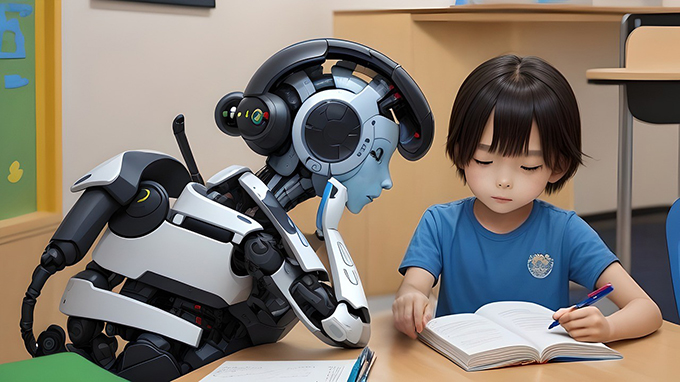
Teachers around the world are wondering whether they should view artificial intelligence tools like ChatGPT as friend or foe in their classroom. My research shows that the answer to this question is not clear-cut and can be taken from either point of view.
To what extent can students be taught to stimulate their creative thinking with these tools rather than simply relying on AI for answers? This is the decisive issue to consider if we want to decide on the advantages or disadvantages of AI in the classroom. This is what my team and I highlighted in our study on the influence of AI on student creativity , published in the Journal of Creativity and in which researchers from the University of South Carolina, the University of California at Berkeley and Emerson College.
As part of this study, we asked students to think – without the support of digital tools – about all the ways to use a paperclip. A month later, we asked them to do the same thing, but using ChatGPT. We’ve found that AI can be a practical brainstorming tool, quickly generating ideas that can drive creative exploration. But it can also have negative effects on students’ thinking skills and self-confidence. Although students said it was helpful to “be able to rely on another brain,” they also felt that using AI was “the easy way out” and did not allow them to think for themselves- same.
These findings call for a thoughtful approach to the use of AI in classrooms and seeking a balance that fosters creativity while utilizing AI’s capabilities .
Technical support to generate new ideas
Students are increasingly using AI as an aid in their schoolwork . Whether it’s writing essays, learning new languages, or studying history and science, AI tools are becoming an essential part of their toolbox.
Students tend to see AI as having a positive impact on their creativity . In our study, 100% of participants found AI useful for brainstorming. Only 16% of students preferred brainstorming without AI.
The good news is that the students in our study produced more diverse and precise ideas when using AI. They found that AI was useful for initiating brainstorming sessions. Other research has shown that AI can also serve as a caring brainstorming partner , which can spark a free flow of ideas that they might self-censor in a group setting, for fear of being laughed at.
Regarding the downsides of brainstorming with AI, students have expressed concern about an over-reliance on the technology, fearing that it will undermine their own thoughts and, therefore, confidence in their creative abilities. Some reported a sort of “mind fixation,” meaning that once they saw AI ideas, they would have difficulty breaking away from them and finding new ones. others by themselves.
The results of the study indicate that allowing students to first test their creativity independently of the tools will build their confidence in themselves and their abilities . Once they have achieved this, AI will be able to help them continue their learning, in the same way that students are taught to use divisions before allowing them to use a calculator.
Guarantee responsible use of tools
Our study mainly explored the application of AI in the generation phase but we also highlighted the importance of skills to be developed throughout the creative process. The essential tasks of defining problems and critically evaluating ideas still rely heavily on human input.
The creative process generally involves three phases, namely problem identification, idea generation and their evaluation. Based on our study, AI shows promise in helping students in the idea generation phase. However, current AIs, like ChatGPT-3 , lack the ability to define the problem or refine ideas into something actionable.
[ More than 85,000 readers trust The Conversation newsletters to better understand the world’s major issues . Subscribe today ]
The growing role of AI in education has many benefits, but it is essential to keep human intervention at the forefront.
Awareness of copyright, issues of plagiarism and “fake news” are among the current challenges of implementing AI in education. As generative AI grows in popularity, schools are under pressure to establish guidelines to ensure responsible use of these tools. Ethical considerations are essential to a positive relationship between creativity and AI.
We will continue our research into the effects of AI on creativity, exploring its impact on agency, confidence and other phases of the creative process. Being interested in the place of AI in education is not just a technical question. It’s about shaping a future where human creativity and technology advance together.
Author Bio: Sabrina Habib is an Associate Professor at the University of South Carolina
